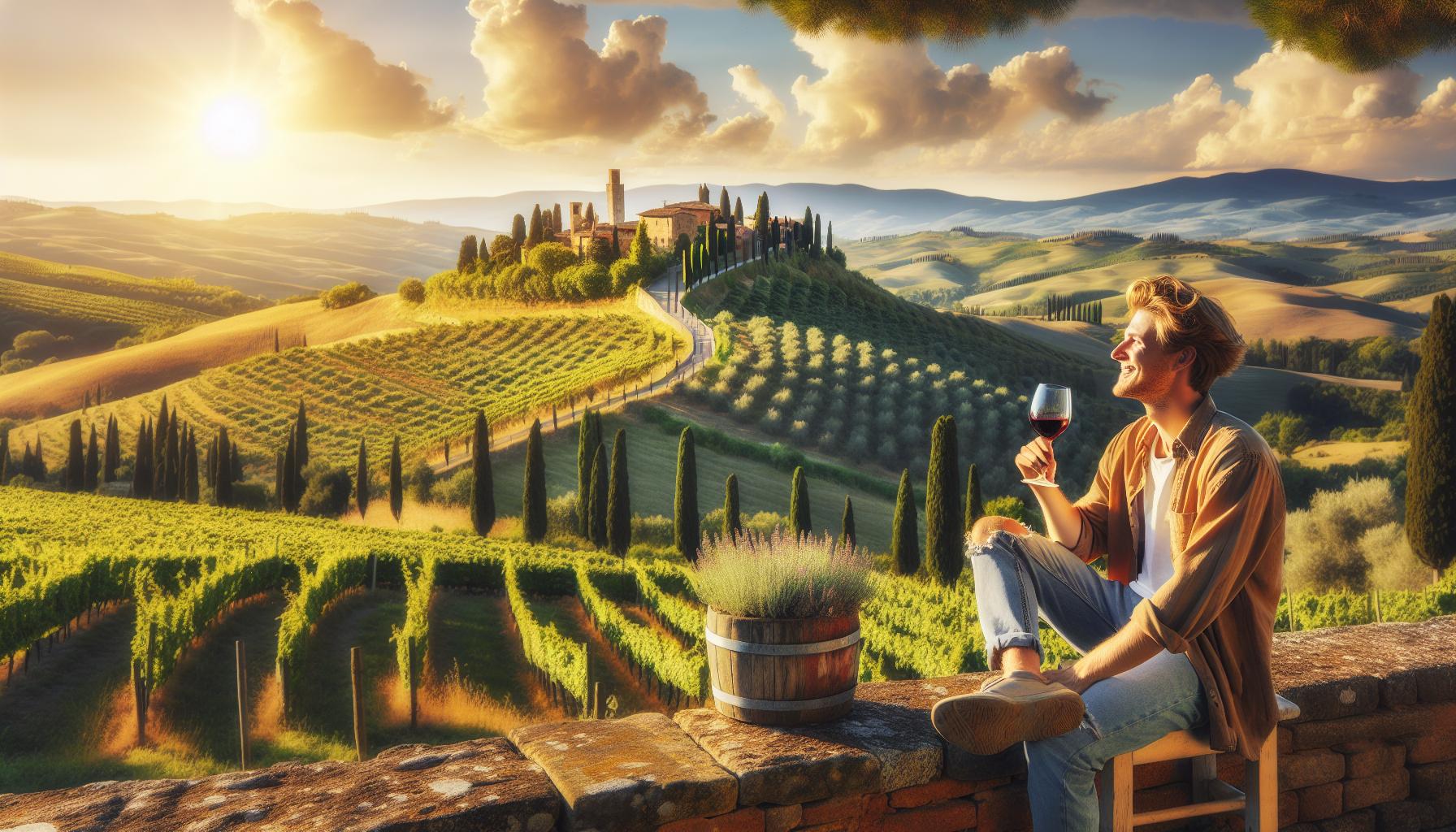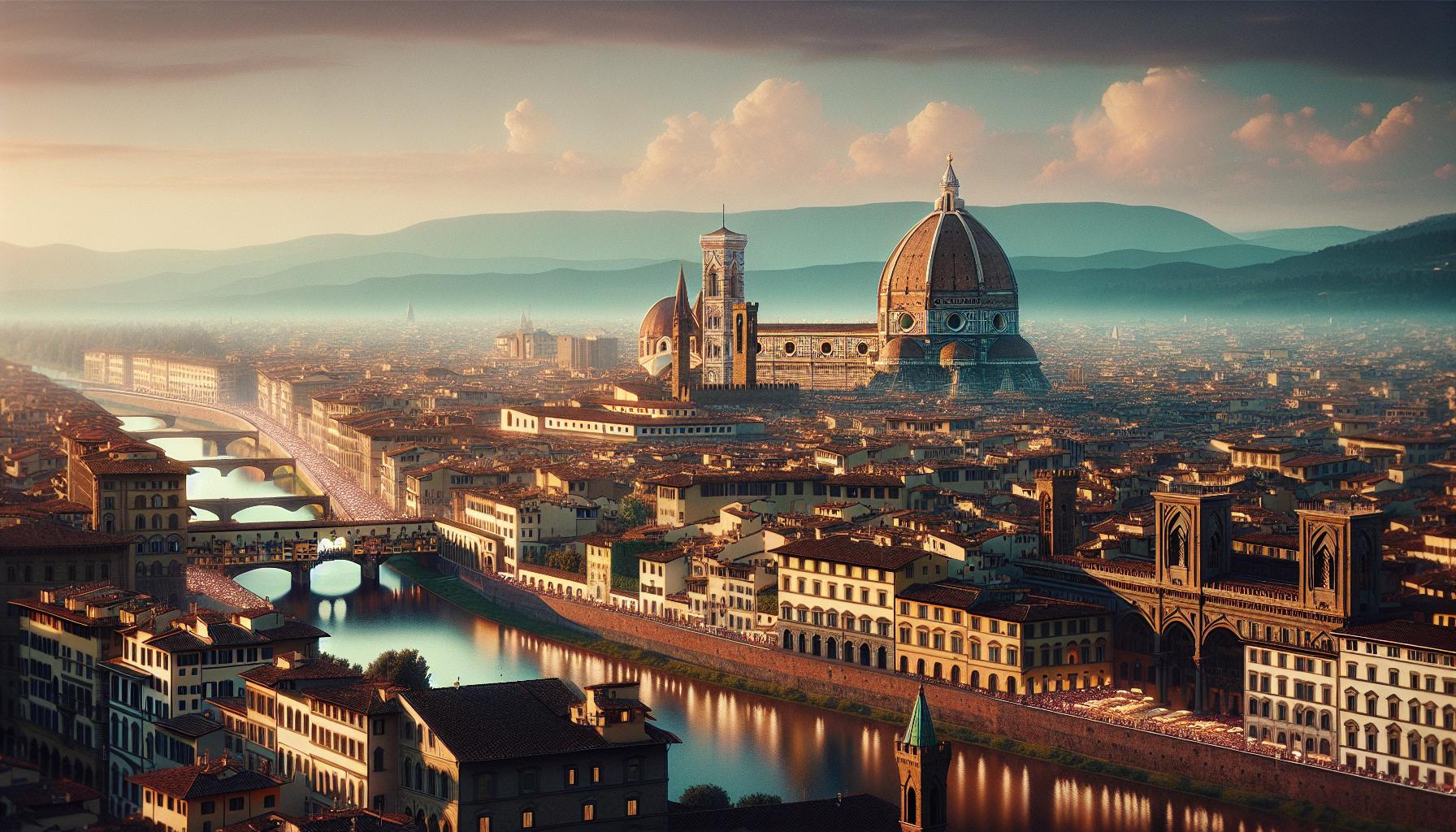Physical Address
304 North Cardinal St.
Dorchester Center, MA 02124
Physical Address
304 North Cardinal St.
Dorchester Center, MA 02124

Tuscany captivates visitors with its rolling hills draped in vineyards magical medieval towns and world-renowned artistic treasures. This enchanting region in central Italy has mastered the art of blending rich history with modern luxury creating an irresistible destination for travelers seeking la dolce vita.
From Florence’s magnificent Renaissance masterpieces to Siena’s charming brick-laden streets Tuscany offers endless possibilities for exploration. Whether it’s sipping Chianti in a sun-drenched vineyard wandering through ancient hilltop villages or marveling at Pisa’s iconic leaning tower every corner of this region tells a compelling story. Travelers quickly discover why Tuscany has inspired artists poets and dreamers for centuries making it one of Italy’s most beloved destinations.
Tuscany captivates visitors with its perfect blend of natural beauty cultural heritage. Vineyards stretch across 150,000 acres of sun-drenched hills producing world-renowned wines like Chianti Brunello di Montalcino. Medieval towns perch atop hills offering panoramic views of cypress-lined landscapes that inspired Renaissance masters.
Art enthusiasts flock to Tuscany’s 300+ museums housing masterpieces from Michelangelo Botticelli Leonardo da Vinci. Florence’s Uffizi Gallery alone displays 2,200 pieces of priceless Renaissance art. Historic architecture dominates city squares with 120 protected medieval structures in San Gimignano alone.
Local cuisine celebrates farm-to-table traditions with:
The region’s cultural landscape includes:
| Cultural Asset | Number |
|---|---|
| Museums | 300+ |
| Medieval Towers | 120 |
| Historic Villas | 4,000 |
| Wine Producers | 2,500 |
Tuscan hospitality transforms restored monasteries castles farmhouses into luxury accommodations. Visitors experience authentic Italian living in agriturismos where families maintain centuries-old farming traditions. The region’s 230 kilometers of coastline features pristine beaches hidden coves dramatic cliffs complementing inland attractions.

Florence stands as the cultural heart of Tuscany, showcasing Renaissance art masterpieces in its museums, palaces, and churches. The city’s historic center, a UNESCO World Heritage site, contains 60% of the world’s most important Renaissance artworks.
The Uffizi Gallery houses 2,200 priceless Renaissance artworks across 45 halls. Visitors explore masterpieces from Botticelli’s “Birth of Venus” to Leonardo da Vinci’s “Annunciation” in chronological order. The Palazzo Vecchio, Florence’s town hall since 1299, features ornate chambers including the Hall of the Five Hundred with its 39-foot-high ceiling decorated by Vasari. The palace’s 308-foot tower offers panoramic views of Florence’s terracotta rooftops. Museum patrons access 14th-century frescoes, medieval artifacts, and Renaissance sculptures throughout three floors of exhibition space.
The Florence Cathedral’s massive dome, designed by Brunelleschi in 1436, spans 148 feet in diameter. Visitors climb 463 steps to reach the dome’s observation deck for city views. The adjacent 277-foot Giotto’s Bell Tower displays Gothic architecture through 56 relief panels. The Ponte Vecchio, dating to 1345, spans the Arno River with 43 jewelry shops lining its edges. The bridge’s elevated Vasari Corridor connects the Uffizi Gallery to Palazzo Pitti, stretching 1 kilometer above the medieval streetscape. The structure survived WWII bombing raids while all other Florence bridges were destroyed.
Tuscany’s hilltop towns transport visitors through centuries of history with their preserved medieval architecture stone streets. These ancient settlements offer spectacular views across rolling vineyards cypress-lined valleys.
Siena stands as one of Italy’s most captivating medieval cities, centered around the magnificent Piazza del Campo. The shell-shaped central square hosts the famous Palio horse race twice each summer, drawing thousands of spectators to witness 10 riders representing different city districts compete. Gothic architecture dominates the cityscape, with the black-and-white striped Siena Cathedral showcasing masterpieces by Donatello Michelangelo. The 102-meter Torre del Mangia provides panoramic views across Siena’s 17 distinct neighborhoods called contrade, each with unique symbols banners. Narrow cobblestone streets wind through the historic center, connecting 170 noble palaces that display the city’s medieval prosperity.
San Gimignano’s skyline features 14 preserved medieval towers from the original 72 that once symbolized the wealth of powerful merchant families. The UNESCO World Heritage site earned the nickname “Medieval Manhattan” for its distinctive vertical architecture. Visitors explore the 13th-century Palazzo Comunale, housing spectacular frescoes in the Sala del Consiglio. The town’s central square, Piazza della Cisterna, contains a 13th-century well that served as the main water source for 800 years. Art enthusiasts discover Ghirlandaio’s frescoes inside the Collegiate Church, while the Vernaccia di San Gimignano wine museum showcases the region’s oldest white wine tradition, dating back to 1276.
Val d’Orcia’s rolling hills showcase Tuscany’s most iconic landscapes, recognized as a UNESCO World Heritage site in 2004. Cypress trees line winding roads through endless wheat fields, creating postcard-perfect vistas that epitomize the Tuscan countryside.
Val d’Orcia produces exceptional wines in 88 registered wineries across 2,000 hectares of vineyards. Notable vineyards include Brunello di Montalcino estates, offering guided tours through ancient cellars dating back to the 14th century. Visitors taste award-winning wines paired with local specialties in historic tasting rooms overlooking terraced landscapes. Leading wineries like Castello Banfi organize specialized tasting sessions featuring 5 distinct wine varieties. Wine enthusiasts explore underground aging caves storing over 7,000 French oak barrels at temperatures naturally maintained at 13°C year-round.
Thermal waters bubble up throughout Val d’Orcia at 15 natural hot springs. Bagno Vignoni features a central pool filled with 49°C thermal water, surrounded by Renaissance architecture dating to the 16th century. Popular spa destinations include Bagni San Filippo with its white calcium formations known as the “White Whale.” San Casciano dei Bagni offers 42 thermal springs producing 5.5 million liters of water daily. Ancient Romans built elaborate bath complexes here, with archeological evidence dating to 600 BCE. Modern wellness centers provide therapeutic treatments using mineral-rich waters containing sulfur, calcium and magnesium.
Pisa enchants visitors with attractions that extend far beyond its iconic tilting tower. The historic city center showcases architectural marvels spanning 1,000 years of history amid a vibrant university atmosphere.
The Piazza dei Miracoli houses four architectural masterpieces in pristine white marble. The Pisa Cathedral, completed in 1092, displays a blend of Classical Roman elements with Islamic-inspired marble inlays across its five-nave interior. Intricate bronze doors created by Bonanno Pisano guard the entrance while 27 paintings adorn the nave’s ceiling. The Baptistery, Italy’s largest, stands 54.86 meters tall with remarkable acoustics demonstrating medieval sound engineering. A stunning mosaic of Christ in Majesty by Cimabue crowns the apse dome of the cathedral. The Camposanto Monumentale features 43 surviving frescoes from the 14th century within its elegant Gothic cloister, including the dramatic “Triumph of Death” masterpiece.
| Piazza dei Miracoli Statistics | |
|---|---|
| Cathedral Construction Period | 1064-1092 |
| Baptistery Height | 54.86 meters |
| Surviving Frescoes | 43 |
| Nave Ceiling Paintings | 27 |
| Site Area | 8.87 hectares |
The Tuscan coastline stretches 230 kilometers along the Tyrrhenian Sea, offering diverse coastal experiences from glamorous beach resorts to untouched natural reserves. Clear waters lap against golden beaches while historic watchtowers stand sentinel on rocky promontories.
The Versilia coast features 20 kilometers of pristine sandy beaches from Marina di Massa to Torre del Lago Puccini. Forte dei Marmi stands out as an exclusive beach destination, attracting international celebrities to its upscale beach clubs equipped with elegant cabanas and fine dining restaurants. The vibrant promenade of Viareggio showcases Art Nouveau architecture with 100 historic buildings while hosting Italy’s most famous carnival celebration. Marina di Pietrasanta offers 8 kilometers of wide sandy beaches backed by the dramatic backdrop of the Apuan Alps rising 1,800 meters above sea level.
Cinque Terre consists of five colorful fishing villages connected by scenic hiking trails and railway lines along the Ligurian coast. Each village displays distinct characteristics: Monterosso features the region’s largest beach spanning 100 meters, Vernazza boasts a natural harbor with a 15th-century castle, Corniglia sits atop a 100-meter cliff surrounded by vineyards. The Sentiero Azzurro trail network spans 12 kilometers, connecting all five villages through terraced hillsides. Visitors access these car-free villages via the regional railway system, which runs 60 trains daily between the towns, or by boat services operating from April through October.
Tuscany stands as a testament to Italy’s timeless appeal offering an unmatched blend of art history nature and culinary excellence. From Florence’s Renaissance masterpieces to the rolling hills of Val d’Orcia this region captivates visitors with its diverse attractions and authentic experiences.
Whether exploring medieval towns sipping wine in ancient cellars or relaxing on pristine beaches Tuscany delivers unforgettable moments at every turn. It’s a destination that proves why Italy continues to enchant travelers seeking both cultural enrichment and luxurious comfort.
The region’s seamless fusion of past and present wrapped in stunning landscapes and warm hospitality makes it an essential destination for anyone dreaming of experiencing the true essence of Italy.